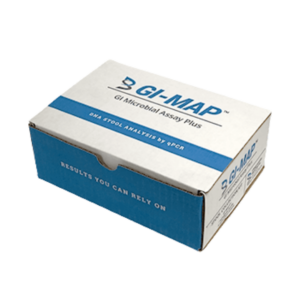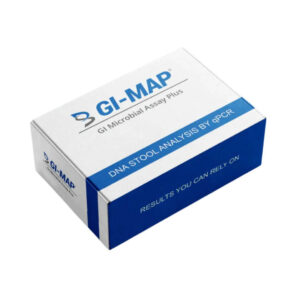Listen up, ladies & gents… if you have GUT issues, this article might just change your life. Take it from someone who spent years going from specialist to specialist to try to figure out what was going on, only to stumble upon this one test that changed my life. This information is truly a game changer. So, let’s dive into the world of gut health. Is a GI-MAP test worth it? What are the pros and cons? Where can you order one?
Keep reading to learn more about this special gut health test.
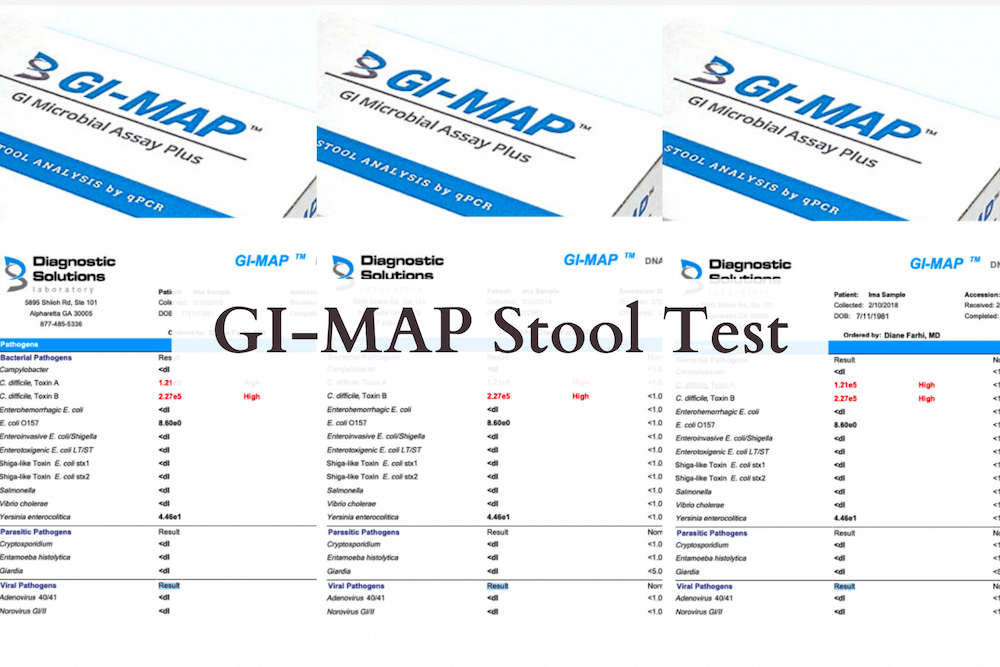
Note: This article contains affiliate links, meaning In On Around will make a small commission at no additional cost to you. This helps me maintain the site. As always, I value full transparency & only work with brands I love and trust.
What Is A GI-MAP Test?
GI-MAP refers to a diagnostic test from Diagnostic Solutions known as the Gastrointestinal Microbial Assay Plus (GI-MAP). It is a cutting-edge, DNA-based stool test designed to analyze the microbial composition of the gastrointestinal (GI) tract. The test helps to identify and quantify different types of gut microorganisms, including bacteria, viruses, parasites, and fungi.
The GI-MAP involves detecting specific genetic markers (key biomarkers) of microorganisms, allowing for accurate and sensitive detection of even low-abundance pathogens and beneficial bacteria.
It provides valuable information about the diversity and abundance of these microorganisms, which can be crucial in understanding the gut’s health and its impact on overall well-being. The test is often used by healthcare professionals, especially functional medicine practitioners, to assist in the diagnosis and management of various gut-related disorders and imbalances.
A GI-MAP is an at-home stool test to analyze your gut health.
Who Should Order A GI-MAP?
This test is great at assessing gut dysbiosis (imbalanced gut microbes), identifying infections, evaluating gut inflammation, and so much more. If you suffer from any of the following symptoms or conditions (even only occasionally), you should consider getting a GI-MAP test:
- Bloating
- Gas
- Diarrhea
- Constipation
- Stomach pain
- Constant acid reflux
- Regular burping/belching
- Autoimmune symptoms
- Inflammatory Bowel Disease (IBD)
- Crohn’s Disease
- Ulcerative colitis (UC)
- Unexplained food intolerances
- Food sensitivities
- Chronic fatigue
- Went through prolonged antibiotic treatments
- Candida
- Small Intestine Bacterial Overgrowth (SIBO)
- Yeast infections… and more.
Not to be dramatic… but if you LIVE on planet Earth you could benefit from this test. It should be a part of a regular annual physical exam.
Gut health is the foundation of overall health.
How To Take A GI-MAP Test
Okay, bear with me here… the collection process isn’t fun, by any means. But you can do it from the comfort of your own home! Let’s dive into the steps (which will also be outlined in your GI-MAP package). Make sure you follow the steps outlined by your practitioner. [1]
What Comes With The Test?
- Kit box
- Test Request Form
- Collection Tray (basically a hot dog tray)
- Specimen Vial
- Gloves
- Zip Closure Specimen Bag
- Absorbent Material
- FedEx Clinical Pak Mailer
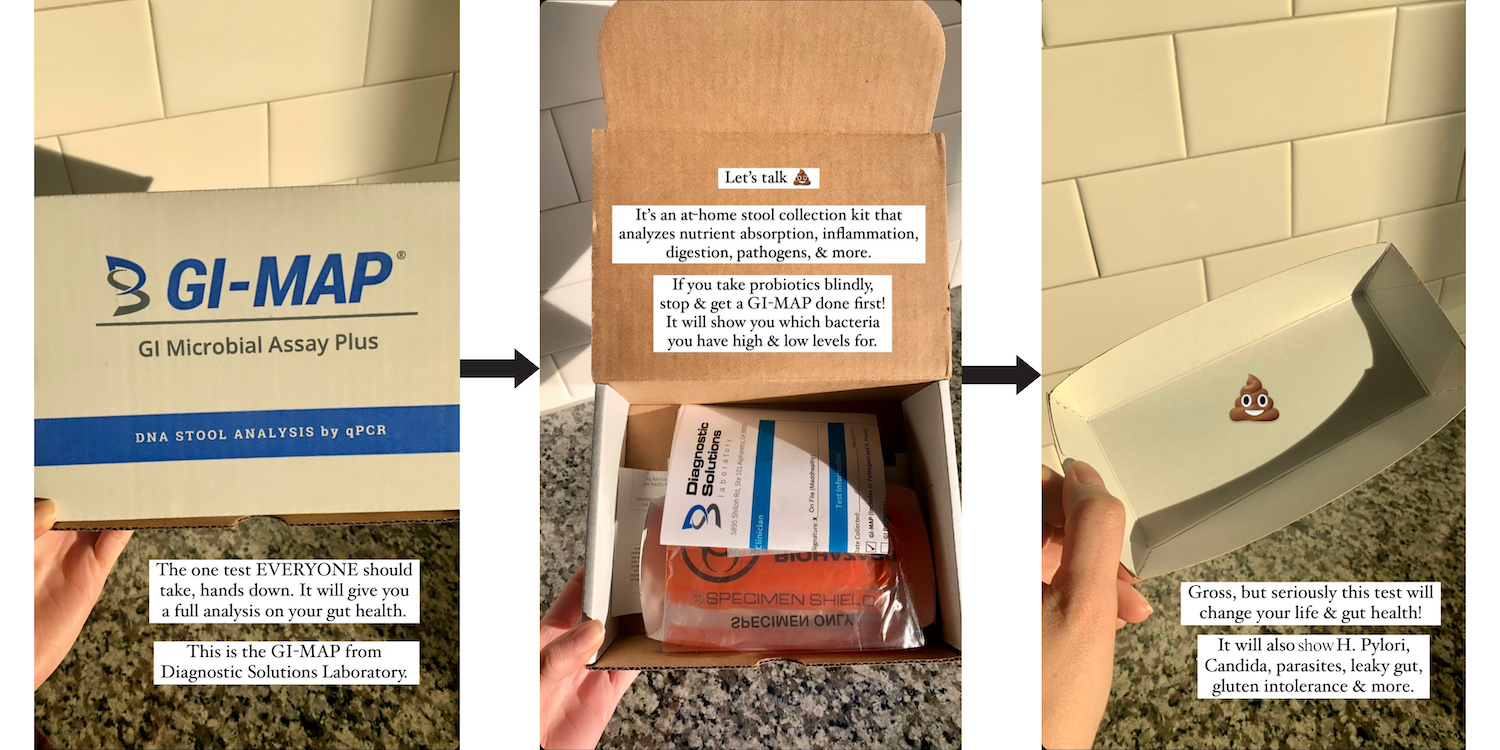
GI-MAP Steps
- Make sure you have all materials ready before starting.
- Fill out the paperwork before starting.
- Void urine prior to the collection & use the collection tray to do your business… if you know what I mean. Don’t forget to wear your GLOVES!
- Using the spoon that’s provided on the cap of the specimen vial, take samples from at least 4 different areas of the collection. The goal is to get multiple samples from your stool.
- Mix and carefully shake the closed specimen vial for about 30 seconds. Make sure it doesn’t spillover and don’t dispose of the pink liquid in the vial.
- Add the sample into the specimen bag.
- Mail it with your paperwork to the Diagnostic Solutions Laboratory using the pre-labeled mailer.
- Clean up and wash your hands thoroughly. Properly dispose of any remaining materials.
The stool sample needs to be received by the lab within 6 days of collection, so if you can’t mail it quickly, refrigerate it and mail it ASAP. It’s best to mail it within 3 days of collection. The sooner the better!
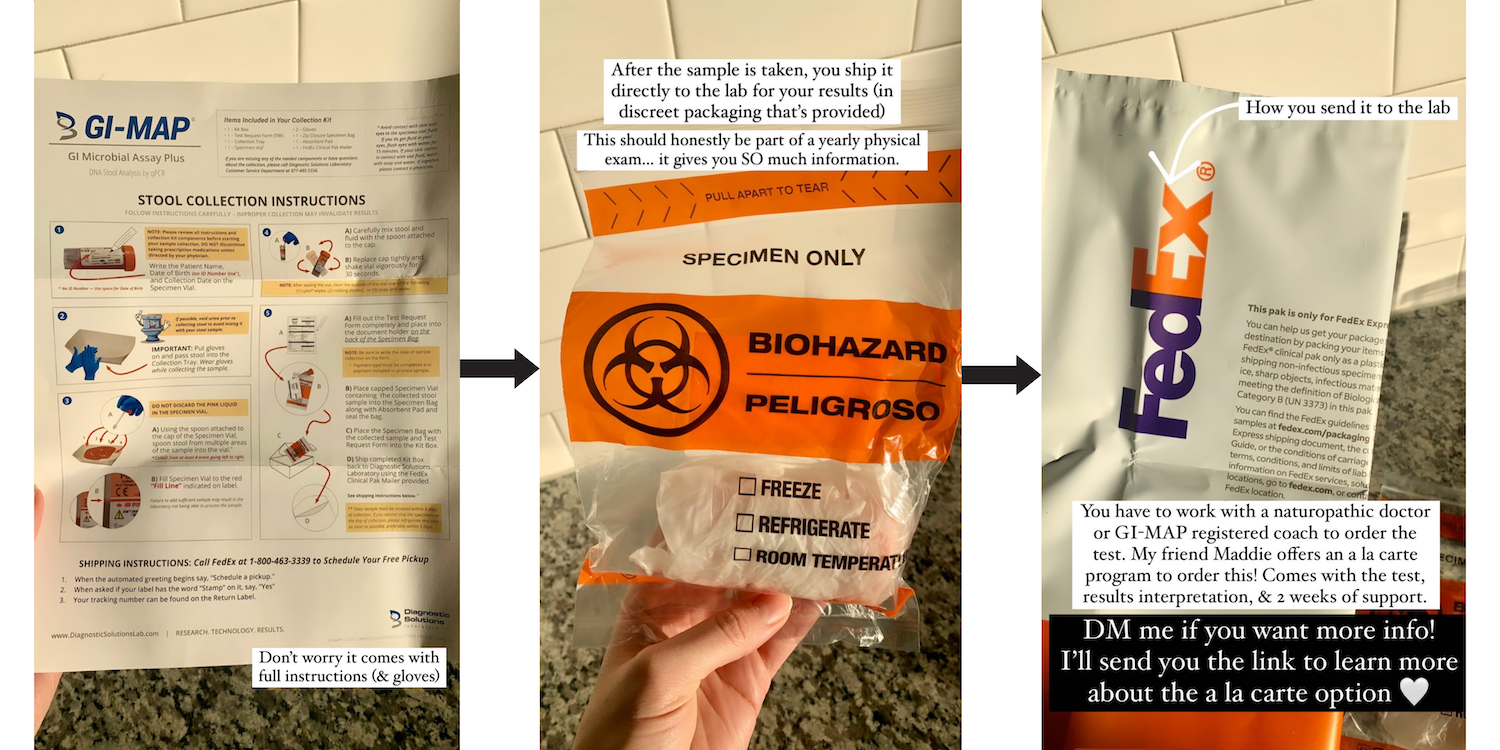
How Long Does It Take To Get GI-MAP Results?
GI-MAP processing times can vary, but typically you can expect to receive your results in about 5 to 10 days after the lab receives your stool sample. [2]
You can read a sample GI-MAP report here.
Why Is The GI-MAP Important For Gut Health?
The GI-MAP (Gastrointestinal Microbial Assay Plus) is important for gut health for several reasons.
For one, the GI-MAP gives a very comprehensive assessment on gut health. The GI-MAP is a highly advanced and comprehensive stool test that can identify and quantify a wide range of microorganisms in the gastrointestinal tract. It provides valuable information about the presence of bacteria, viruses, parasites, and fungi in the gut, giving healthcare professionals a detailed picture of the gut microbiome.
The gut is known as the “second brain.” It communicates extensively with the central nervous system & can impact mood, cognitive function, mental and physical health.
In addition, it can help identify pathogens and detect imbalances so the patient can get the best treatment. This is essential for proper diagnosis.
The GI-MAP is particularly effective at detecting pathogenic microorganisms that may be causing infections or contributing to gut-related illnesses. Identifying and treating these pathogens can help alleviate symptoms and prevent complications. Understanding the specific microbial imbalances and infections allows healthcare professionals to target therapies and interventions more effectively.
My Real-Life GI-MAP Success Story
Storytime: I struggled with my gut health for over 10+ years after a rough bout with a stomach virus. I visited many gastroenterologists and specialists to try to get to the bottom of what was causing my uncomfortable symptoms, like severe bloating and stomach pain (… where I regularly looked 6 months pregnant).
From colonoscopies, and endoscopies, to biopsies, I did it all. At the time, I was popping 6+ Tums a day to help with the constant acid reflux and taking corticosteroids, antihistamines, and a list of other over-the-counter and prescription medications. No one batted an eye.
Very long story short, I was told that it’s just Irritable Bowel Syndrome… which is basically a catch-all umbrella term when doctors don’t know the actual cause of the problem. I was told to learn to live with it, take MiraLAX, antacids, and calm down. [Related article: Can Too Many Antacids Hurt You Or Make Reflux Worse? 10 Alternatives]
I didn’t accept this diagnosis and life. I founded In On Around and dove into the world of holistic health where I came across the GI-MAP… and I’m SO glad I did. After taking my first GI-MAP, it turned out that I had Giardia (a parasite), a Helicobacter pylori (H. pylori) infection (which can cause stomach ulcers), a lot of microbial imbalance that could allow opportunistic bacteria to thrive, and a very high immune response to gluten (high anti-gliadin IgA). It was definitely not just “IBS.”
Because of this diagnostic tool, I was able to address the root cause of my symptoms. Ever since, I’ve been gluten-free and I’ve cleared my infections with targeted supplements (while working with a naturopathic doctor). It has hands-down CHANGED my life for the better.
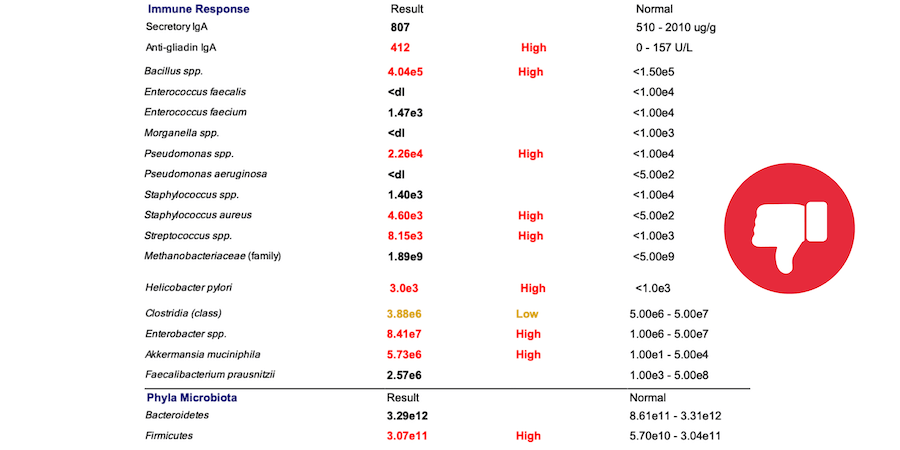
How Often Should You Get A GI-MAP Test?
I like recommending getting a GI-MAP test done every year to understand your baseline levels. Although this test can be somewhat cost-prohibitive, so do your best to get it done as regularly as you can. If you’re experiencing specific digestive upset, it can also be a good time to test for imbalances.
GI-MAP Pros & Cons
Let’s dive into the pros & cons! First, the pros…
Pros of GI-MAP
- Very in-depth gut health test – it’s extremely comprehensive!
- Highly sensitive (will detect low-abundance microorganisms)
- Fast turnaround time
- Offers personalized interventions
- Identifies pathogens, which helps in treatment and diagnosis
- Can be used to regularly monitor progress and gut health improvement
Cons of GI-MAP
- Cost – it’s usually it is not covered by health insurance and can be upwards of $500
- Can’t be shipped to every state (although there are some workarounds for this – talk to your practitioner)
- Limited availability & awareness by conventional doctors
- Results can be difficult to interpret if you’re not familiar with the test
- It provides a single snapshot (like any stool test – only for that specific point in time)
The pros certainly outweigh the cons, in my book.
Interpreting GI-MAP Stool Test Results
It’s best to seek professional interpretation and guidance when you receive your GI-MAP results! This is why it’s essential to work with a qualified practitioner. Diagnostic Solutions also offers a free and extensive Interpretive Guide, which can be very helpful if you’re trying to interpret the results on your own.
Looking for non-toxic product recommendations?
Other Gut Health Tests
Some conventional doctors can offer a traditional stool culture or a PCR-based stool test. So what’s the difference? Should you just get a stool test with your doctor or gastroenterologist?
1 – Traditional Stool Culture:
- Cultures specific bacteria in the stool sample to identify and quantify pathogens that can be grown under specific laboratory conditions.
- Primarily focuses on bacterial infections and may miss non-culturable or fastidious microorganisms.
- Turnaround time is longer, typically several days or more.
- Limited coverage and may not provide a comprehensive view of the gut microbiome.
- Less sensitive and may yield false-negative results for certain pathogens.
2 – PCR-Stool Test:
- Uses Polymerase Chain Reaction (PCR) technology to amplify and detect specific genetic markers of microorganisms in the stool sample.
- Can detect a broader range of microorganisms, including bacteria, viruses, parasites, and fungi.
- Faster turnaround time compared to traditional stool culture.
- Provides higher sensitivity, enabling the detection of low-abundance microorganisms.
- Offers a more comprehensive view of the gut microbiome compared to traditional culture.
3 – GI-MAP (Gastrointestinal Microbial Assay Plus):
- This is a specific type of PCR-based stool test that uses DNA analysis to assess the gut microbiome comprehensively.
- Covers a wide range of microorganisms, including bacteria, viruses, parasites, and fungi, as well as genetic markers for antibiotic resistance and virulence factors.
- Provides highly sensitive and accurate results, detecting both cultivable and non-cultivable microorganisms.
- Faster turnaround time compared to traditional stool culture.
- Offers a comprehensive view of the gut microbiome, allowing for the identification of dysbiosis, infections, and other gut health-related issues.
In summary, traditional stool culture is focused on culturing specific bacteria, while PCR-stool tests, including the GI-MAP, use molecular techniques to amplify and detect genetic material, offering a broader and more sensitive assessment of the gut microbiome. The GI-MAP, in particular, provides an extensive analysis of the gut ecosystem, making it a valuable tool for understanding gut health and guiding personalized treatment strategies.
Where Do You Order A GI-MAP?
Only certain practitioners can order a GI-MAP test. They must be registered with the manufacturer and they must be properly qualified to analyze the results.
Here are a couple of options:
1 – Work With A Naturopathic Doctor
If you work with a holistic or functional doctor, many are able to order GI-MAPs. Make sure you ask them if they regularly order and analyze these types of tests (not all of them do). If you’re looking for a naturopathic doctor in your area, check out the AANP website.
Look for a naturopathic physician who…
- Graduated from a 4-year naturopathic medical school (with a doctoral degree) from any of the 8 accredited schools (there are now 7 that are active since the University of Bridgeport ended their program)
- They should have passed the NPLEX
- Important note: a naturopath can be different than a registered naturopathic doctor – don’t be confused! The later went to medical school.
2 – Work With A Qualified Practitioner, like my friend, Maddie!
If you’re interested in ordering a test from someone I trust, please let me know! You can purchase a GI-MAP with an extensive results interpretation video on Maddie’s website here (make sure you tell her In On Around sent you – she’ll take good care of you)!
Check out the GI-MAP program here! Mention that In On Around sent you in the “How did you hear about us?” section!
3 – Order Online
Ordering through online methods, like IFDW. (I have not tried these programs personally, so I can’t attest to their customer service, but they are options and at a decent price!). Sometimes these websites do not provide test interpretation, so use caution. Make sure you vet the company in depth before submitting any information – there are many online.
Final Thoughts – So Is A GI-MAP Test Worth It?
I highly recommend ordering a GI-MAP gut health test. It has changed my life and it can change yours (no this isn’t a sponsored article – I truly believe in it). Please reach out on Instagram if you have any questions… or if you would like to share your GI-MAP story with me!
Ready to learn more about gut health? Check out this article: Can Too Many Antacids Hurt You Or Make Reflux Worse? 10 Alternatives
⬇ Pin this “Is A GI-MAP Test Worth It?” pic on Pinterest for future reference! ⬇

Frequently Asked Questions – Is A GI-MAP Test Worth It?
Click on the below FAQs to learn more about DNA-based stool test, microbial diversity, pathogenic microorganisms, gut health research, gut-immune system connection, DNA sequencing for gut analysis, and more.
How does the GI-MAP test differ from traditional stool culture methods?
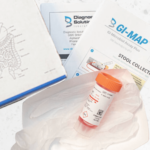
The GI-MAP test differs from traditional stool culture methods as it utilizes advanced DNA-based technology to comprehensively analyze the gut microbiome, detecting a broader range of microorganisms, including bacteria, viruses, parasites, and fungi, with higher sensitivity and faster turnaround time.
Where can I find a reliable healthcare provider or laboratory offering GI-MAP tests in my area?
Are GI-MAP tests trustworthy?
Can the GI-MAP stool test help identify specific gut pathogens and imbalances linked to certain health conditions?
Have you done a GI-MAP test?
Let me know your thoughts and key takeaways in the comments below!
You can watch our web story here.
xoxo,

Want to read more? Check out my other articles here!
Other references on Is A GI-MAP Test Worth It?: Diagnostic Solutions Lab, Nikki Yelton RD, Ann Arbor Holistic Health, Hungry Hobby, Dr. Chris Jones, Dr. Laura Brass
Copyright In On Around LLC 2023 ©. The statements made on this website have not been evaluated by the FDA (U.S. Food & Drug Administration). They are not intended to diagnose, treat, cure, or prevent any disease. The information provided by this website should not be used as individual medical advice and you should always consult your doctor for individual recommendations and treatment. The information contained in this site is provided on an “as is” basis. Related to this site, there are no guarantees of completeness, accuracy, usefulness, or timeliness. In On Around LLC assumes no responsibility or liability for any errors or omissions in the content of this site.

